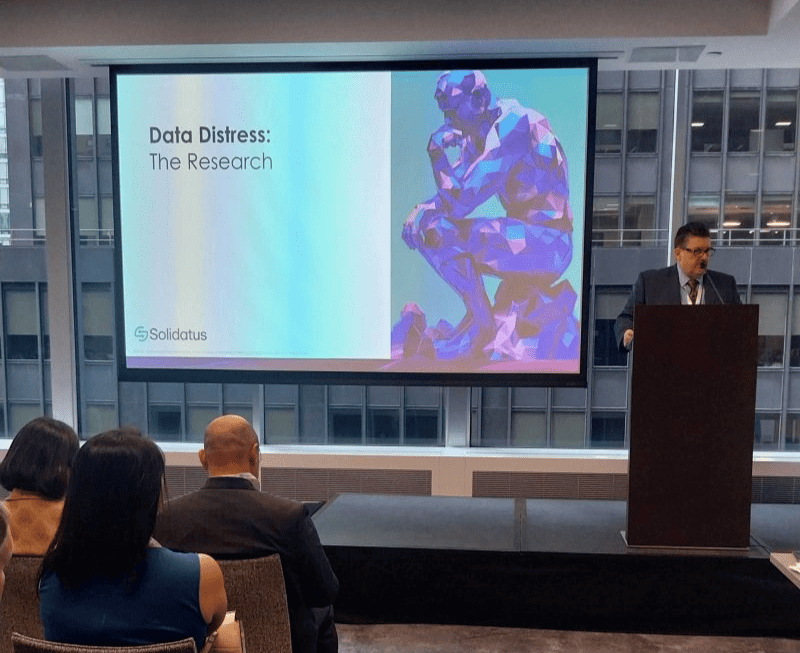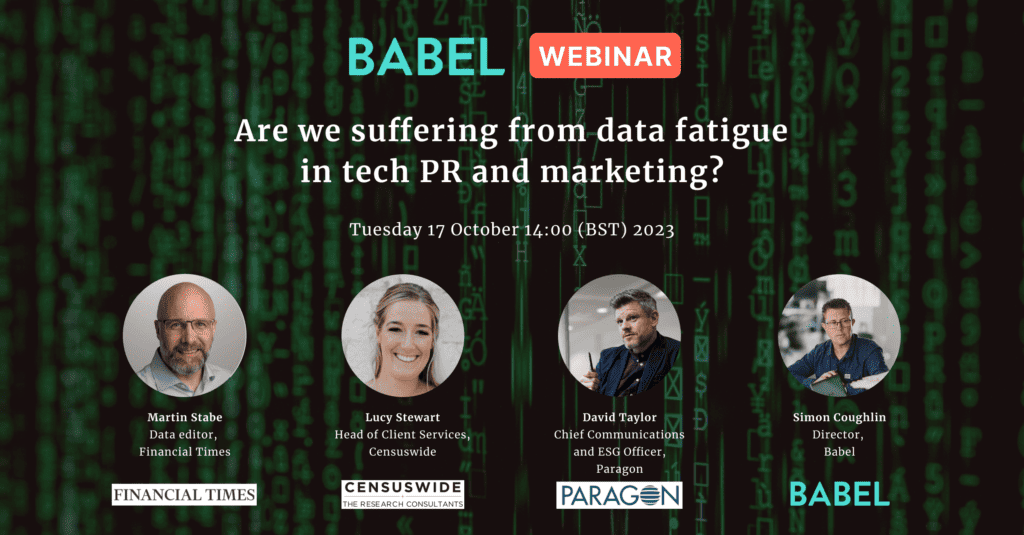Data in PR and Marketing: How to avoid journalists becoming another victim of 'data distress'
If you work in PR or marketing, data is one of the most important tools in your professional armoury.
Data not only proves the value of your profession, from coverage numbers and share of voice to sales leads and website views, but it also forms the foundation of the most rewarding content that you and your teams create.
Making an Impact with Data-driven Communications
At Babel, we emphasize the role of data-driven PR campaigns. Whenever we put our client spokespeople through rigorous media training, this is always one of the main takeaways. The most important message in those sessions is that when meeting with an influencer, whether a journalist or analyst, you need to support all of your claims with data. It is not enough to make declarations about the value of your products and services. They need to be supported with hard facts - statistics or proof points which illustrate your sector expertise or prove how you have 'moved the needle' for your clients.While data is the bedrock of PR and marketing, it is also the lifeblood of businesses across multiple sectors. When companies gather and analyse data effectively, it can boost productivity, provide compelling insights and often be crucial in the race to stay ahead of their competitors.
Spotlight: Big Data LDN
The importance of data analysis was the focus of 'Big Data LDN', a recent gathering of more than 180 data-related tech vendors and consultants at London's Olympia. Following long spells post the start of the COVID-19 pandemic when such events were not possible, one thing is clear - tech events are truly back in business. When I attended there were long queues to hear from expert speakers in the various themed theatres - from analytics and storytelling to generative AI (of course!) and data science.
It was a pleasure to meet up with clients including Solidatus, which works with some of the biggest financial services brands to help them visualise their data relationships, simplifying how they identify, access, and understand them.

Case Study: Solidatus & Managing Data Growth
We have recently been working with the Solidatus team on a research project examining the way in which organisations are managing the rapid growth of data and the pressures facing data leaders, particularly in highly regulated, complex firms.
By working with an external research agency, we found that 71% of senior data leaders in the sector are on the brink of quitting their jobs, 87% say the stress impacts their mental health and wellbeing, and 80% say it affects their ability to do their job properly.
The message from Solidatus CEO and founder, Philip Dutton, is clear - too many disparate and siloed sources of data are causing 'data distress', and he said urgent action is needed to protect the mental health of senior data leaders. As part of the campaign, we worked with Danielle Haig, an independent business psychologist who coaches senior business leaders, who responded to the research data by calling on data leaders to prioritise self-care through a healthy work-life balance and seeking support with the right tools and techniques.
This campaign was a great example of how the human element of technology, and the way in which it is used in our professional lives, can play an important role in B2B PR and marketing. Not only has it resulted in positive media coverage, but the research findings have been compiled into a gated whitepaper on the Solidatus website, providing a channel for potential sales leads. The Solidatus team has also been talking with stakeholders about the findings of the research at recent events, including at the Data Management Summit in New York.

Upcoming Webinar: Unpacking Data in PR
The Solidatus example demonstrates the way in which market research and data-driven stories can form the basis of compelling campaigns. However, with journalists receiving data-heavy reports and press releases each day, how do tech brands ensure they select the 'right' data to gain traction with the media and their target audiences? That will be the focus of our next free webinar, taking place at 1400BST on 17 October 2023, which will delve into the nuances of data in PR and marketing.
Among the topics under discussion include:
- What makes 'good' - and 'bad' - data from a journalist's perspective;
- How brands can find and use data to support their message;
- How marketers can maximise their investment in data-driven campaigns to help their sales teams drive leads;
- The role of research agencies in helping tech firms to find the third-party data they need.
Joining the expert panel will be:
- Martin Stabe, data editor, Financial Times;
- David Taylor, chief communications and ESG officer, Paragon (a Babel client);
- Lucy Stewart, head of client services, Censuswide.
For more information, click the banner below:




.jpg)

.jpg)

.jpg)
